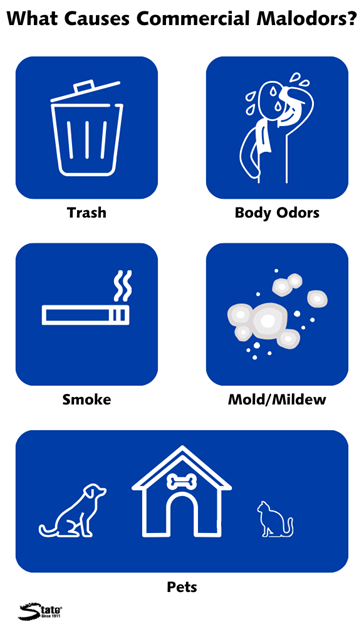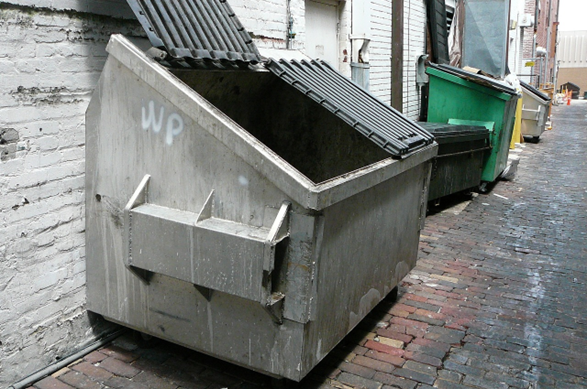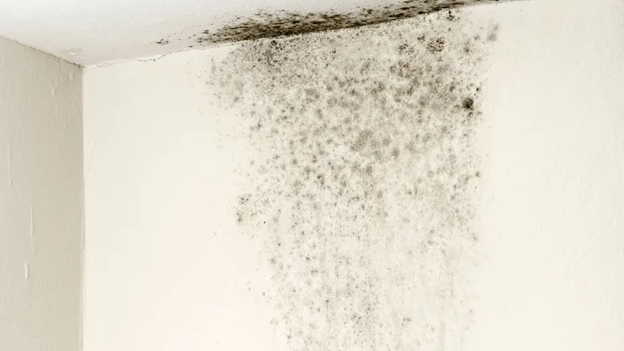What Causes Commercial Odors?
What Causes Commercial Odors?
Imagine this: you oversee the sanitation of an assisted living facility. Your staff does everything they’re tasked to keep the facility clean, but there’s no denying it: the building smells. Even through the lobby, there’s a lingering stale, musty scent. You notice it and guests notice it.
If you’re cleaning regularly and using handheld air fresheners, why is this still happening? And how are you supposed to get rid of such stubborn odors?
At State Chemical, we manufacture and distribute chemical solutions for various applications, including odor control. We know it can be challenging to get to the bottom of a persistent malodor problem—even more so when the fragrancing solutions you’ve tried haven’t made a difference.
To help you better understand your odor problems, we’ll explain where your malodors may be coming from, how they impact your business, and how to get rid of them. After reading, you’ll know why your odors may be lingering and how to put a stop to this problem.

What are Common Sources of Stubborn Commercial Odors?
Malodors can come from virtually anywhere, usually in places associated with the bacterial breakdown of organics. But most of the time, they fall under one of five categories:
Trash Odors
It’ll usually be pretty obvious when your facility is experiencing trash odors. If you’ve ever held your breath while opening a dumpster, you know this. While the severity varies depending on the specific area (e.g., trash rooms will be more pungent than a dumpster due to less ventilation), when you’re dealing with rotting organics and bacteria, malodors spread quickly.

Body Odors
An issue you might not immediately consider is body odor. Unfortunately, when many individuals move through a space over time, the space tends to hang onto body odors, such as those caused by sweat. The room itself can hang onto these odors, or they can be absorbed by furniture and fabrics.
For example, let’s say you run a fitness center. With people working out in your facility every day, the area smells thoroughly like sweat. No matter the location, in a situation like this, body odors will linger in the open.

Meanwhile, if you ran the assisted living facility from the beginning of the article, the smell might be in the air, but it’s also probably clinging to fabrics. Just think about people sitting on the same couches every day—after a bit, their sweat will seep into the couches, giving them that distinct odor.
Additionally, consider odors from other bodily substances, like urine, blood, vomit, and more.
Let’s imagine for a minute that you work in a hospital’s trauma center. With severe wounds and constant surgeries, your facility sees a lot of blood—and when you’re in an enclosed room with a lot of blood, it smells. And if this occurs at a high frequency, the metallic odor will start to linger in the space. Now you’re in a situation where visitors are panicking because the facility smells like blood.
This is an extreme example, but the same goes for other body odors in your facility. And when people walk in and smell other people’s icky bodily substances, chances are that they’re not going to stick around.
Smoke Odors
Where there is smoking, there are smoke odors, and these really linger. This is true in the sense that smoke odors will linger in a room on their own, but the odors are especially difficult when they’re absorbed by fabric and furniture.

Suppose you’re a hotel manager. If a room reeks of cigarettes no matter how often you spray it down with an air freshener, it’s likely that this odor has been absorbed in the drapes, upholstery, and bedding. This becomes a more urgent problem for you as you scramble to prepare the room for future guests.
Pet Odors
Pet odors are the problem that plagues all animal lovers. As much as you may welcome furry friends into your facility, the fact remains that they can create something of a mess. Urine, animal dander, fecal matter, and more can create odor problems for your facility, and no one wants themselves or their pets in an environment that smells unclean.

As with the previously mentioned odors, pet odors may linger in an open space if pets are commonly present, but it’s just as likely that specific furniture and fabrics are holding onto these odors.
For example, if a dog has an accident on the carpeted floor of a hotel room and it isn’t properly cleaned, the odor is going to stick around. As the head of housekeeping, you may be prepping a newly vacant room for a check-in in three hours only to discover an awful stench. Without much time to spare, this can be a headache.
Mold & Mildew Odors
Additionally, mold and mildew can give your facility a musty scent, which doesn’t help forge positive associations with visitors. However, your issue is more than the odor.

Mold and mildew are unhygienic and can cause allergic reactions and other health issues. For the safety of your staff and guests, it’s best to treat for mold and mildew elimination rather than for odor control.
How Do Bad Odors Affect a Commercial Facility's Image?
Knowing how all these odors might affect your facility, the question remains: how will this impact your business?
Odors are obviously not the way to leave a good impression on customers. Scent is a strong trigger of memory, so when your facility has a bad smell, it develops a negative connotation in a customer’s mind.
Think about a place you’ve been where a smell struck you as unpleasant. It might be a thrift store that smelled musty, a restaurant bathroom that smelled like rotten eggs, or a friend’s house that smelled of cat urine. Whatever it may be, an unpleasant image comes to mind, and you probably don’t want your facility users to feel that way about your location.
But the impact of smell doesn’t need to be negative. On the flip side, a good fragrance can foster positive associations in the minds of your customers.
Think about a place you’ve been that smelled good. Maybe it was a bakery that smelled like fresh pastries, a local store with lavender sachets on each shelf, or a relative’s house with a caramel spice candle. It’s easier to remember the locations that strike you as pleasant-smelling, and when you treat your odor problems, customers will view your business this way too.
How to Eliminate Odors in a Commercial Facility
The first step toward odor solutions is determining what kind of solution will work for your specific problem.

First, consider where the odor is coming from. If it’s a continuous problem for the room as a whole, look into an odor-eliminating air freshener or a fragrance system.These solutions will treat odors in the air while also adding a pleasant fragrance to your space if desired.
Meanwhile, if the odor comes from a specific area, such as a piece of furniture or a dumpster, invest in a product for odor spot treatment. This can mean a fabric refresher, a handheld odor eliminator, or another ready-to-use product targeted toward a specific area.
Once you know what kind of solution you need, you can continue to research products based on your personal needs (e.g., allergy-friendly options) and find the best product for your facility.
Learn About State Chemical's Air Care Program
Odor problems are everywhere, and they can be challenging to solve when there are many potential sources. Now that you know where your odor problems might stem from and how to solve them, watch the video below to learn about State Chemical’s air care program.









